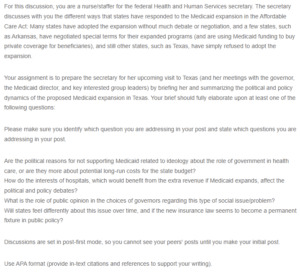Health Policy Process – Medicaid Expansion Discussion
Access to healthcare remains a traditional problem within American communities. The Affordable Care Act of 2010 was a landmark reform that conceived proposals to expand Medicaid eligibility to cover Americans of low income. The adoption of Medicaid, however, varies across states. To date, the majority of the states have adopted these provisions, with only 11 states left. Medicaid expansion has drawn both political and healthcare interest. Singer & Rozier (2020) assert that Medicaid expansion has been opposed mainly by conservative politicians who lament its cost. Instead, they postulate alternative measures to enhance access to care among poor Americans. While it remains a political agenda in most conservative states yet to adopt these provisions, underprivileged Americans in those states continue to suffer. This begs the question: What is the role of public opinion in the choices being made by governors regarding this type of social issue/problem?
Public opinion influences the choices made by governors regarding Medicaid expansion and other important state reforms. Public opinion not only signals preferences on various issues under scrutiny but also notifies legislatures of the potential voting behaviour of the public. For this reason, the public has a powerful lobbying effect on the policy-making process. Medicaid expansion has drawn ambivalent opinions among the American public. Cusick et al. (2022) report that in most conservative states, the public opinion on Medicaid expansion is mainly drawn on party lines, with many Americans who subscribe to conservative politics tilting towards opposing its provisions. This affects states’ legislative decisions on whether or not to pass legislation that will see Medicaid expansion. In these states, the decision to expand Medicaid is likely to be passed when the public plays a more active role in voicing their opinions.
References
Cusick, J., Gordon, P., Parshall, J., Shepherd, M., Lofgren, E., Rapfogel, N., Rosenthal, J., Sozan, M., Mirza, Z., Glass, A., Buchanan, M. J., & Banks, L. (2022). How partisan gerrymandering limits access to health care. Centre for American Progress. Retrieved January 20, 2023, from https://www.americanprogress.org/article/partisan-gerrymandering-limits-access-health-care/.
Singer, P. M., & Rozier, M. (2020). Shifting threats and rhetoric: How Republican governors framed Medicaid expansion. Health Economics, Policy, and Law, 15(4), 496–508. https://doi.org/10.1017/s174413312000002x.
ORDER A PLAGIARISM-FREE PAPER HERE
We’ll write everything from scratch
Question 
For this discussion, you are a nurse/staffer for the federal Health and Human Services secretary. The secretary discusses with you the different ways that states have responded to the Medicaid expansion in the Affordable Care Act: Many states have adopted the expansion without much debate or negotiation, and a few states, such as Arkansas, have negotiated special terms for their expanded programs (and are using Medicaid funding to buy private coverage for beneficiaries), and still other states, such as Texas, have simply refused to adopt the expansion.

Health Policy Process – Medicaid Expansion Discussion
Your assignment is to prepare the secretary for her upcoming visit to Texas (and her meetings with the governor, the Medicaid director, and key interested group leaders) by briefing her and summarizing the political and policy dynamics of the proposed Medicaid expansion in Texas. Your brief should fully elaborate upon at least one of the following questions:
Please make sure you identify which question you are addressing in your post and state which questions you are addressing in your post.
Are the political reasons for not supporting Medicaid related to ideology about the role of government in health care, or are they more about potential long-run costs for the state budget?
How do the interests of hospitals, which would benefit from the extra revenue if Medicaid expands, affect the political and policy debates?
What is the role of public opinion in the choices of governors regarding this type of social issue/problem?
Will states feel differently about this issue over time, and if the new insurance law seems to become a permanent fixture in public policy?
Discussions are set in post-first mode, so you cannot see your peers’ posts until you make your initial post.
Use APA format (provide in-text citations and references to support your writing).
